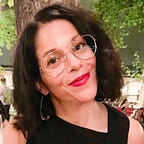I Learned About My Family History from a Paper Written by a Secondary School Student in Germany.
It was part of an assignment to bring to light the stories of dozens of students who once attended, but were forced to leave, an all-girls Bavarian school.
What holds the secret to your family history? Maybe it’s a set of journals, scrawled with intimate secrets and accounts of daily life at another time. Or, maybe it’s a worn shoebox filled with old photos, yellowed around the edges with names and dates scribbled on the back of each one. For me, it’s a school paper about my German-Jewish grandmother, written by a secondary school student in Bavaria, Germany in 2019, which I sat down and carefully read just a few months ago.
As a granddaughter of a Holocaust survivor, I learned from an early age not to ask too many questions and not push for too many answers. So I took her life at face value and cherished any story or memory my grandmother was ready, willing and able to share from her past. After my grandmother’s death I thought that was it. The holes that riddled her story would remain. That was until I started reading that school paper written by a secondary school student in Bavaria, Germany, filled with facts, photos and so many of the things we never dared to talk about as a family.
So, why is it that a Bavarian secondary school student wrote a paper about my German-Jewish grandmother who left their shared hometown in 1937 to never return? Because it was assigned to her as part of a history and religion seminar at her school.
In Germany schools are required to educate students about the Holocaust. Some schools take their students to visit concentration camps while others have them read Anne Frank’s diary in class. Some schools take that education even further. Like the all-girls school my grandmother attended until Jewish students were denied the right to do so.
Upon finding annual reports and student files from the time of National Socialism, my grandmother’s former school learned of 40 Jewish students who attended classes there from 1930 to 1938. But, they just knew their names, not their stories. To learn more, the school made my grandmother and the other Jewish students the focus of several of its history and religion seminars.
The teachers leading the seminar encouraged their students to gain a better understanding for the historic and religious influences on current events at that time, and to learn more about Jewish identity and life in their city — then and now. Each seminar participant was assigned one Jewish student and tasked with understanding the impact of those events on their life. To do so, they had to seek to answer questions such as: What was their life like in the 1930s? How did local residents and the school deal with the Jewish students? What happened to them? Were they able to emigrate to other countries, did they successfully hide from the Nazis, or were they murdered during the Holocaust?
At first the student who was assigned my grandmother had trouble locating any information on her. Until, while conducting research at the local municipal archives, she found a file with letters my grandmother’s brother (my great uncle) wrote in German to local officials, authors and historians from 1978 up until his death in 1998. From those letters, the student gleaned important details about my grandmother’s family, including where they emigrated, when they arrived and how they viewed their time in Germany. The missing piece in the student’s search proved to be one of my cousins in Israel, who connected her to my father. From there, my father was able to shed light on my grandmother’s life in the United States and the continuation of our family lineage with the birth of her children, grandchildren and great grandchildren.
The end result of the students’ collective research were detailed biographies on the former Jewish students, each one telling a story of how exclusion, hostility and persecution uproots and changes the trajectory of a person’s life. The student who researched my grandmother produced a 23-page biography, with pages and pages of facts, cited sources, photos and more. Within the pages, I learned so many heart-wrenching truths about my grandmother’s past and glimpses of the life and the people she had to leave behind.
I had mixed emotions as I read the last page of my grandmother’s biography. I was thankful my grandmother’s story was treated with respect and care. I was happy to have so many pieces of my grandmother’s story finally fall into place. I felt humble knowing, as a non-German speaker, that I wouldn’t have easily found and understood the wealth of information contained in the local municipal archives. I felt overwhelmingly sad for the restrictions, losses and cruelty my grandmother, her family and so many other German-Jewish people endured at that time. I also found myself feeling disappointed that this school paper, written by a total stranger, was the main source of information on my grandmother’s story.
Ultimately, as the tide of emotions ebbed, I felt an intense need to control my grandmother’s narrative, for her, for me and for our family, now and into the future. So that’s what I did. I went through each of the carefully cited sources in the biography and secured them one by one. I then started to translate each one into English so I can understand them, too. I’ve also just begun to share her story in bite-sized pieces for me and my family. For we are the ones who owe everything to her.
